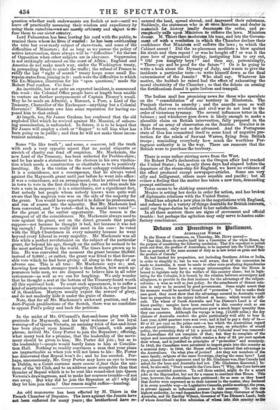Some "lie like truth " ; and some e converso,
tell the truth with such a very opposite aspect that no social etiquette or Stretch of charity can fend off suspicion. Mr. Mackenzie, the hew Lord of the Treasury, has been reelected for Peebles-shire; and he has made a statement to the electors in his own vindica- tion which needs a construction so charitable as to be positively insulting. He is the victim of the most unhappy coincidences. It is a coincidence not a consequence, that he always voted against the Maynoolh grant until just before he went into office : it was a coincidence, not an arrangement, that he arrived too late in town to vote in the first division this year, and thus made his Vote a vote in suspense : it is a coincidence, not a significant fact, that nobody but people whom nobody knows were quite well aware that the ungiven vote was on the side of the majority for the grant. You would have expected it to follow its pred.ecessors, and run of course into the minority. But Mr. Mackenzie had been converted, and "he voted—that is, he would have voted "- for the grant at the earlier opportunity. The reason is the strangest of all the coincidences. Mr. Mackenzie always used to vote against the grant, not on the direct grounds that people suppose—not because he thought it bad, but because it was not big enough I Extremes really did meet in his case: he voted with the High Churchmen in every minority- because he went beyond every Liberal in every majority. Mr. Mackenzie was all his while a perfect revolutionist on the subject of the particular grant, far beyond his age, though on the surface he seemed to be the most natural Tory in the world. The times have grown up to him. He was converted the moment the grant became 26,0001. instead of 9,0001.; or rather, the grant was fitted to that favour- able vote which he had been giving all along in the shape of an adverse one. This is all true : Mr. Mackenzie saps so ; and, knowing how much stranger truth is than fiction, how much ap- pearances belie men, we are disposed to believe him in all sober seriousness—as well as we can for laughing. We only wonder that he thought a seat at the bottom of the Treasury-board worth all this equivocal look. To court such appearances, is to suffer a lin id of martyrdom to conscious integrity, which is, to say the least of it, thankless. Martyrs usually expect the reward of glory, and do not modestly hide it under the guise of shame.
• Note, that for all Mr. Mackenzie's awkward position, and the Anti-Popish predilections of the Scotch, there was no candidate to oppose Peel's policy and back the petitions.


























 Previous page
Previous page